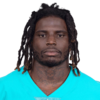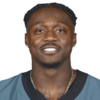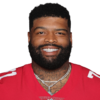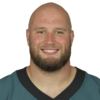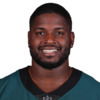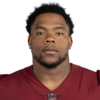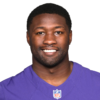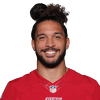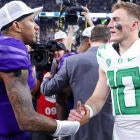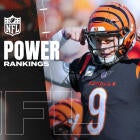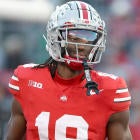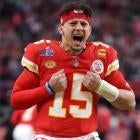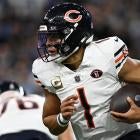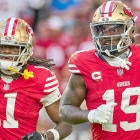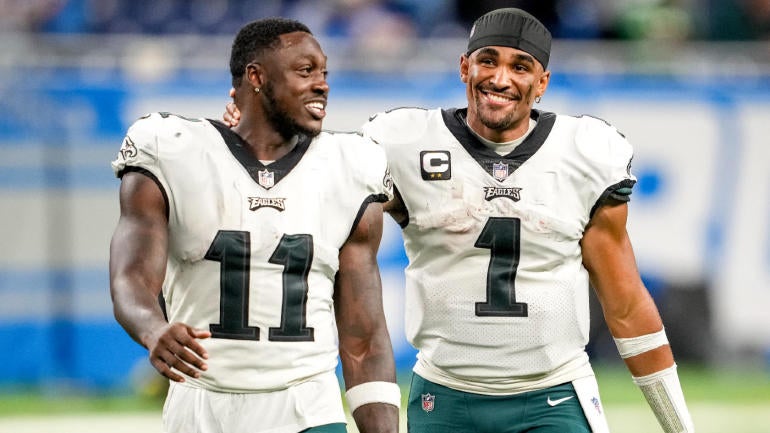
Creating the ultimate 53-man roster isn't difficult when there aren't any parameters. It becomes more challenging when operating under a salary cap. Roster construction gets more complicated with other restrictions designed to help prevent a squad from resembling last season's All-Pro team. The constraints bring more realism to selection process. The ground rules are as follows.
Parameters
- The salary cap for the roster is $229.3 million although the actual NFL salary cap is $224.8 million for this year. The number being used approximates the average adjusted salary cap according to NFLPA data. Each NFL team's working salary cap varies largely because unused cap room can be carried over from one year to the next. For example, the Browns have the NFL's highest adjusted salary cap at $251.77 million largely thanks to carrying over almost $27.6 million of cap room, which is the most in the league. The Super Bowl LVII champion Chiefs have the lowest at $220.4 million, which is $4.4 million below the league wide number. Situations like this typically occur when incentives earned during the previous season that weren't counting on the cap get accounted for without sufficient cap room carrying over from the prior year to make up the difference.
- The NFL Draft is an essential element of roster building for NFL teams. It is here also. One player from each round of the 2023 draft must be on the roster. The number requirement drops by one player for each year of the preceding three drafts (2020-2022). The limit of one player per round remains. Thus, only four 2020 draft picks are required. There's one other draft pick constraint. Only one 2019 first round pick whose fifth year option was exercised is allowed. Selecting one isn't a necessity.
- The backups at each position are limited to players that aren't established starters, were reserves in 2022 or lost a starting job this year. This means young veterans cracking the lineup for the first time are eligible as reserves. Those starting last season only because of an injury are also fair game as backups. Players competing for starting jobs in the preseason or where there's a "by committee approach" at a position, usually running back, are also acceptable. A backfield containing Nick Chubb and Derrick Henry is prohibited since both are workhorse or every down running backs.
- Choosing a player that was given a franchise or transition designation in 2023 is optional. However, only one player receiving a 2023 designation can be selected.
Roster-building philosophy
The initial version of the team was done without paying attention to cost. Over $260 million of cap space was used. Multiple roster adjustments were necessary in order to comply with the constraints.
I decided that all players would have a cap number under $15 million to create more options in creating the roster. There were plenty of players I would have liked to include but were luxuries that couldn't be afforded become of my self-imposed limitation. For example, quarterback Patrick Mahomes (Chiefs), defensive tackle Aaron Donald (Rams), edge rusher T.J. Watt (Steelers) and running back Derrick Henry (Titans) weren't options because of $39,693,381, $26,003,245, $24,371,644 and $16,370,007 cap numbers.
Selecting a high level quarterback was the top priority since the NFL is a passer driven league. A cap friendly potential franchise quarterback is the most valuable commodity in the NFL. This is because of the roster flexibility provided by the low cap number. Choosing one was a necessity.
The old football adage of "it starts in the trenches" was a guiding principle in assembling the roster. A particular emphasis was placed on the offensive line. Putting pressure on the quarterback and forced turnovers were guiding principles with the defensive line and secondary respectively. There are three starting cornerbacks instead of a traditional base defense (either 3-4 or 4-3) since five or more defensive backs are now used over 60% of the time in the NFL.
Long range planning wasn't taken into account so worrying about future salary cap obligations, the amount of cap room that could be carried over, expiring contracts and drafting players that might develop into starters down the road wasn't necessary. Different choices would have been made if these aspects had been considerations.
Here's the team I assembled with some of my thoughts behind the selections. The 2023 cap number for each player is in parentheses.
Offensive starters
QB: Jalen Hurts, Eagles ($6,162,546), 2020 2nd Round
Hurts fits the criteria of a top flight quarterback with a modest cap number. The roster flexibility Hurts' cap number provides couldn't be ignored.
Hurts was the leading candidate for NFL MVP last season until a sprained right shoulder in the Week 15 contest against the Bears forced him to miss the next two games, which the Eagles lost. He completed 66.5% of his passes for 3,701 yards with 22 touchdowns and only six interceptions to post a 101.6 passer rating. Hurts added 760 yards on the ground, which was 5th in the NFL among quarterbacks. His 13 rushing touchdowns were tied for league's second most.
Mahomes having the NFL's largest cap number eliminated him from consideration. Hurts being the best player in Super Bowl LVII last February when the Eagles lost to the Chiefs 38-35 also helped his cause.
RB: Christian McCaffrey, 49ers ($3.424 million)
McCaffrey was attractive because he's cost effective while being the best dual threat running back in the NFL. After being traded to the 49ers during the middle of last season, McCaffrey resembled the player who in 2019 joined after Roger Craig and Marshall Faulk as the only NFL players to ever have at least 1,000 rushing yards and 1,000 or more receiving yards during the same season.
WR: Tyreek Hill, Dolphins ($12,899,355)
Hill had a career year during his first season in Miami with 119 catches, 1,719 receiving yards and seven touchdown receptions in 2022. He was second in the NFL in both catches and yards. Hill helped transform the Dolphins into the league's most explosive passing offense averaging an NFL best 8.2 yards per pass play. Although Hill is arguably the league's most feared deep threat because of his speed, he'll spend considerable time operating out of the slot. According to Pro Football Focus, 42.1% of Hill's passing snaps were in the slot last season.
WR: A.J. Brown, Eagles ($8,322,434)
Brown had a career best 88 receptions and an Eagles franchise record 1,496 receiving yards last year in his first season in Philadelphia after a surprising trade from the Titans during the first round of the 2022 draft. His 17.0 yards per catch ranked third in the NFL. Brown also tied for the league's third most receiving touchdowns with 11. He earned his second Pro Bowl berth and was named second team All-Pro for the first time in his career.
WR: Justin Jefferson, Vikings ($4,175,438), 2020 1st Round
Nobody has ever had a more productive start to an NFL career at wide receiver than Jefferson. 2020's 22nd overall pick has 324 receptions for 4,825 yards and 25 touchdowns during his first three seasons. Jefferson's 128 catches and 1,809 receiving yards not only led the NFL last season but are the seventh and sixth best single season totals in league history.
TE: George Kittle, 49ers ($9,583,356)
Kittle is probably the NFL's best combination of blocking and pass catching in a tight end. Having to share the wealth in San Francisco's offense with McCaffrey and wide receivers Brandon Auyik and Deebo Samuel means he won't be reclaiming the single season receiving yards record by a tight end he set in 2018 with 1,377 yards, which Travis Kelce subsequently broke. Kelce's $14, 801,949 cap number, which is second among tight ends, removed him from consideration.
Kittle wasn't an option until the 49ers converted $10.57 million of his 2023 base salary into signing bonus, which lowered his $18,039,356 cap number by $8.456 million, last week.
LT: Trent Williams, 49ers ($12,369,424)
Williams has been the NFL's best left tackle since signing a six-year, $138.06 million contract that made him the league's highest paid offensive lineman at $23.01 million per year. The 35-year old isn't showing any signs of slowing down. Thankfully, the 49ers created $14.588 million of 2023 cap space last week by restructuring Williams' contract. He would have been too cost prohibitive with a $27,227,424 cap hit. Otherwise, Jordan Mailata (Eagles) would have been the choice with his $7.417 million cap figure.
LG: Joel Bitonio, Browns ($6.732 million)
Bitonio provides one of the NFL's best combinations of run and pass blocking for an offensive guard. He's adept at both. Bitonio allowed just one sack this season.
C: Creed Humphrey, Chiefs ($1,527,224), 2021 2nd Round
Humphrey has quickly entered the league's best center discussion in just two NFL seasons. His low cap number made him a necessity. Humphrey didn't allow any sacks and only two quarterback hits last season.
RG: Zack Martin, Cowboys ($11,758,260)
Martin earned first-team All-Pro honors for the sixth time in 2022. He didn't allow any sacks and was whistled for just one penalty last season.
RT: Lane Johnson, Eagles ($14,720,998)
Johnson continues to be standard at right tackle. 2022 was Johnson's second straight season without surrendering a sack.
Defensive starters
Edge: Nick Bosa, 49ers ($11.01 million)
The reigning NFL Defensive Player of Year, who led the league with 18.5 sacks last season, wasn't a viable option because of the $15 million cap hit constraint until he got a new deal. The 49ers picked up $6.849 million of immediate cap relief when Bosa recently became the league's highest paid non-quarterback at $34 million per with his five-year, $170 million contract extension.
DT: Javon Hargrave, 49ers ($6.595 million)
Hargrave's ability to be disruptive landed him a four-year, $84 million contract in free agency. His career high 11 sacks last season were fourth in the NFL among interior defensive linemen.
DT: Daron Payne, Commanders ($8.61 million), Franchise Player
Payne elevated his game as a pass rusher last season while remaining a force against the run. He was third in the NFL among interior defensive linemen with a career high 11.5 sacks. Payne's 18 tackles for loss were the most in the league for an interior defensive lineman.
Edge: Maxx Crosby, Raiders ($12,978,250)
Crosby had a career high 12.5 sacks last season. More importantly, Crosby's 182 quarterback pressures (combined sacks, quarterback hurries and quarterback hits) are the most in the NFL over the last two seasons (2021 and 2022) according to PFF.
LB: Micah Parsons, Cowboys ($4,659,305), 2021 1st Round
Nobody else was seriously considered as the 2021 first round pick for the team. Although the 2021 NFL Defensive Rookie of the Year is transitioning to a full-time edge rusher, he's lining up at linebacker where he started his professional career. Parsons, who had 13.5 sacks and was the Defensive Player of the Year runner up last season, will get plenty of opportunity to rush the passer from inside and out in addition to playing linebacker.
LB: Roquan Smith, Ravens ($9,003,835)
Smith took his game to another level after being traded from the Bears to the Ravens last season. He was arguably the league's best off-ball linebacker while with Baltimore. The Ravens made Smith the NFL's first and only $20 million per year off-ball linebacker with a five-year, $100 million contract right before the playoffs started.
CB: Jaire Alexander, Packers ($10,755,765)
Alexander picked off five passes and made the Pro Bowl last season. The highlight of Alexander's season was the Packers holding Justin Jefferson to a career low one catch for 15 yards during Week 17 with him being primarily responsible in coverage. Jalen Ramsey ($2,935,245 cap number) would have gotten this slot but a training camp injury to his left knee has him out until December.
CB: Sauce Gardner, Jets ($7,608,949), 2022 1st Round
Gardner was arguably the league's best cornerback in a debut season in which he was named NFL Defensive Rookie of the Year and was a first team All-Pro. Opposing quarterbacks completed 45.9% of passes (34 of 74 attempts) when targeting Gardner for a 53.9 passer rating according to PFF.
CB: Tariq Woolen, Seahawks ($961,904), 2022 5th Round
Woolen has rare size (6'4", 210 pounds) and speed (4.26 seconds in the 40-yard dash) for a cornerback. He earned Pro Bowl honors last season with six interceptions, which tied for the NFL lead.
FS: Minkah Fitzpatrick, Steelers ($7,937,720)
Fitzpatrick is a classic ballhawk in the middle of the field. He garnered first team All-Pro honors last season after tying for the NFL lead with six interceptions and breaking up 11 passes.
SS: Talanoa Hufanga, 49ers ($1,007,118), 2021 5th Round
Hufanga was named first team All-Pro by the Associated Press last season in his first year as a starter. He provides tremendous value given he's playing under a four-year rookie contract worth a little more than $3.72 million.
Specialists
- K: Justin Tucker, Ravens ($5,958,334)
- P: Ryan Stonehouse, Titans ($882,478)
- LS: Morgan Cox, Titans ($1,101,055)
- KR: Marcus Jones, Patriots ($1,186,020)-2022 3rd Round
- PR: Jones
Tucker is the most accurate kicker in NFL history hitting 364 of 402 field goal attempts for a 90.5% conversion rate (minimum of 100 made). He also holds the record for the longest field goal in NFL history at 66 yards. Stonehouse set an NFL single season record in 2022 as a rookie with a 53.1 yard gross punting average. Jones handles return duties. He led the NFL last season with 12.5 yards per punt return. He also averaged 23.9 yards per kickoff return. Cox was named to his fifth Pro Bowl last season as the AFC's long snapper.
Reserves
Quarterback
- Brock Purdy, 49ers ($897,513), 2022 7th Round
The 49ers didn't miss a beat once Purdy, the last pick in the 2022 draft, was pressed into action last season when Jimmy Garoppolo had a season ending foot injury in Week 13. In five games as a starter, all 49ers wins, Purdy completed 68.5% of passes (85 of 124 attempts) for 1,098 yards with 11 touchdowns and two interceptions. Purdy had the league's best passer rating over the last five weeks of the season at 119.0. The 49ers felt comfortable trading Trey Lance, 2020's third overall pick, to the Cowboys during the preseason because of Purdy.
Running backs
- Breece Hall, Jets ($2,058,251), 2022 2nd Round
- Jamaal Williams, Saints ($1,888,260)
- Elijah Mitchell, 49ers ($994,153), 2021 6th Round
- Michael Burton, Broncos ($1,101,645)
Hall will be primary ball carrier in relief of McCaffrey. He was a leading candidate for NFL Offensive Rookie of the Year before tearing the ACL in his left knee during a Week 7 contest last season. Williams had his first 1,000 rushing yard season in 2022 and led the NFL with 17 rushing touchdowns. He will get the call in short yardage situations. Once Alvin Kamara returns from his three game suspension for violating the league's Personal Conduct Policy, Williams' is going to take on more of a supporting role in New Orleans. Mitchell's inability to stay healthy helped open the door to the 49ers trading for McCaffrey. Knee problems limited Mitchell to five games last season. He nearly rushed for 1,000 yards as a rookie in 2021 picking up 963 yards in 11 games. Burton is the lone fullback. Since Burton is primarily going to play special teams there isn't a need for tie up cap resources in Kyle Juszczyk, who has a $6,567,581 cap number.
Wide receivers
- Zay Flowers, Ravens ($2,555,780), 2023 1st Round
- Rashid Shaheed, Saints ($878,260)
- Puka Nacua, Rams ($814,649), 2023 5th Round
The Ravens are encouraged that Flowers, who was the second wide receiver taken in this year's Draft, can be a long term number one receiving option for Lamar Jackson. Shaheed didn't start getting meaningful playtime last year until Michael Thomas had season ending toe surgery. The 2022 undrafted free agent averaged 17.2 yard per catch, which was the second best mark in the NFL. Nauca is getting every opportunity to prove he should remain on the field when Cooper Kupp comes off the Rams' injured reserve, which could be as early as Week 5.
Tight ends
- Josh Oliver, Vikings ($2.554 million)
- Austin Hooper, Raiders ($2.75 million)
Oliver emerged as one of the league's best blocking tight ends last year. His development led to him signing a three-year, $21 million contract with the Vikings to complement T.J. Hockenson, who recently became the NFL's second highest paid tight end at $16.5 million per year. Hooper was second on the Titans with 41 receptions as a part of the three-man tight end rotation in a run oriented offense last season. He'll be pressed for playing time in Las Vegas by Michael Mayer, who the Raiders moved up in the second round of this year's Draft to take him. Greg Dulcich's (Broncos) hamstring injury prevented him from being chosen over Hooper. He would have been the 2022 third round pick instead of Marcus Jones.
Offensive line
- Josh Jones, Texans ($2.743 million), 2020 3rd Round
- Graham Glasgow, Lions ($2,688,260)
- Zach Tom, Packers ($1,005,220), 2022 4th Round
- Nick Harris ,Browns ($1,095,742), 2020 5th Round
Versatility was a must with the offensive line depth. Jones, who was acquired from the Cardinals during the preseason is capable of playing anywhere except center. Glasgow, who had started 91 of the 99 games he had played before this season, lost a preseason competition for Detroit's right guard job to Halapoulivaati Vaitai. He can play either guard spot as well as center. Tom is settling in right tackle in Green Bay after getting a majority of his playing time last season at left tackle while David Bakhtiari was injured. He will be the swing tackle. Harris was slated to start at center for the Browns in 2022 until his season was ended with a right knee injury during the preseason. Ethan Pocic has been firmly entrenched at center since stepping in to replace Harris, who has also previously seen some action at right guard.
Edge
- James Houston, Lions ($970,000), 2022 6th Round Pick
- Nick Herbig, Steelers ($922,375), 2023 4th Round Pick
Houston had eight sacks in seven games last season after the Lions signed him off their practice squad. Herbig opened some eyes during the preseason because of his 3.5 sacks.
Defensive tackles
- Quinton Jefferson, Jets ($2,061,180)
- Jordon Riley, Giants ($774,902), 2023 7th Round
Jefferson was a salary cap casualty in Seattle as the Seahawks made wholesale changes to the interior of the defensive line despite a career high 5.5 sacks last season. Riley is strictly a run stuffer.
Linebackers
- Kamu Grugier-Hill, Panthers ($1,101,645)
- Monty Rice, Titans ($1,329,201), 2021 3rd Round Pick
- Jack Sanborn, Bears ($881,645)
- Drew Sanders, Broncos ($1,046,970), 2023 5th Round Pick
Grugier Hill, Rice, Sanborn and Sanders' primary contributions will be on special teams. Sanborn was a tackling machine last season after being inserted to Chicago's starting lineup with Roquan Smith's midseason trade to the Ravens. An ankle injury sidelined Sanborn for the last three games of the season. Grugier-Hill has the most experience of the bunch. He had 13 tackles for loss with the Texans in 2021.
Cornerbacks
- Shaquill Griffin, Texans ($1,980,599)
- Marcus Jones, Patriots ($1,186,020), 2022 3rd Round
- Kei'Trel Clark, Cardinals (805,998), 2023 6th Round
Griffin provides experienced depth at cornerback. He had started 72 of his 76 career games heading into this season. A back injury ended Griffin's season after five games in 2022. The Jaguars released Griffin in March rather than pay him $13 million this season. Jones will make his mark returning kicks although he returned one of his two interceptions last season for a touchdown. Clark surprisingly has earned a starting berth for the rebuilding Cardinals.
Safeties
- Rodney McLeod, Browns ($1,093,680)
- Brian Branch, Lions ($1,462,198), 2023 2nd Round Pick
- Reed Blankenship, Eagles ($879,926)
McLeod, a 12 year veteran, can play either safety position. He's currently taking over for free safety Juan Thornhill, who has a calf injury. Branch should be a candidate for All-Rookie honors. Blankenship filled in nicely at free safety while Chauncey Gardner-Johnson was out for five games last season with a lacerated kidney. Gardner-Johnson's departure to Detroit in free agency opened the door for Blankenship to crack Philadelphia's starting lineup.
Tale of the tape
- Total salary cap room used (53 players): $220,255,820
- Remaining salary cap room: $9,044,180
- Offense (25 players): $115,689,768
- Defense (25 players): $96,624,185
- Specialists (3 players): $7,941,867
Positional salary breakdown
(Salary cap percentage in parentheses)
- QB: $7,060,059 (3.08%)
- RB: $9,466,309 (4.13%)
- WR: $29,635,916 (12.92%)
- TE: $14,887,356 (6.49%)
- OL: $54,640,128 (23.93%)
- DE: $25,880,625 (11.29%)
- DT: $18,041,082 (7.87%)
- LB: $18,022,601 (7.86%)
- CB: $22,299,235 (9.72%)
- S: $12,380,642 (5.4%)
Final thoughts
All of the cap room isn't being used. A cushion has been left for a full practice squad of 16 players (approximately $4.35 million) and to sign players when the inevitable injuries happen during the season. There's about $4.65 million to spare after accounting for the practice squad.
There is a bigger allocation of cap resources to offense despite the small cap expenditure at quarterback. 50.45% of the cap went to the offense while 42.14% was devoted to defense. Offensive line accounts for 23.83% of the available cap space.
The 49ers lead the way with eight players. The only other team with more than three players selected is the Eagles. There are four Eagles on the squad. Surprisingly, only one member (Creed Humphrey) from the defending Super Bowl champion Chiefs is on the team. Seven teams (Bengals, Bills, Buccaneers, Chargers, Colts, Falcons and Jaguars) didn't have a player selected. All but the Colts and Falcons were playoff teams last season.










